ELTA, BNS
The Lithuanian parliament fired Center for the Study of the Genocide and Resistance of Residents of Lithuania (Genocide Center) general director Adas Jakubauskas Thursday.
Full story in Lithuanian here.
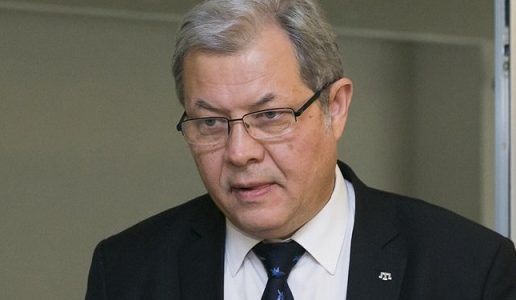
ELTA, BNS
The Lithuanian parliament fired Center for the Study of the Genocide and Resistance of Residents of Lithuania (Genocide Center) general director Adas Jakubauskas Thursday.
Full story in Lithuanian here.
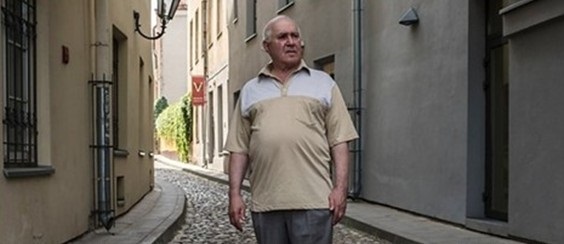
Photo: Pinchos Fridberg, the only Jew left in the Lithuanian capital of Vilnius who was born there before the Nazis invaded in 1941. By Brendan Hoffman for the New York Times.
by professor Pinchos Fridberg, an alter vilner id [an old Jew born and raised in Vilnius]
“Rebe, will there ever come a time when the words Vilne and Yidish will be inseparable again?”
“Saydn nor mit Meshiakh’n ineinem.” [Not unless it comes with the Messiah.]
Introduction
The article “Как это делалось ин Вилнэ…” [This Is How It Was Done in Vilne] became the main feature for issue no. 505 of the international magazine “Мы Здесь” [We Are Here] in 2015. More than 7,000 people read it, and I began receiving letters from people whom I didn’t know.
The largest Russian-language weekly newspaper in Lithuania “Обзор” [Review] reprinted this article on its website on March 8, 2021.
The article concerns the history of Jewish Vilnius.
I think it might be interesting to non-Russian-language readers as well. *
“This is How It Was Done in Vilne…”
As I was putting my archive in order, I came across a small program for a concert to celebrate the 10th anniversary of the Jewish volunteer collectives. This program is more than half a calendrical century old. I think the reader might be interested to see “how it was done in Vilne.” The program contains over 30 photographs. I will present a few of them. I believe it has long been time for them to be revived on the wider internet.
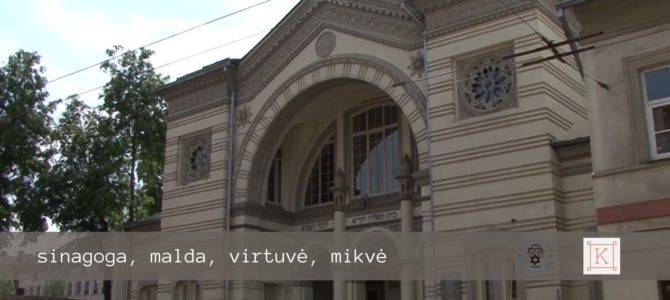
The Lithuanian Jewish Community is inviting the public to take a virtual tour of the only synagogue operating in Vilnius according to all Jewish laws, the Choral Synagogue. The virtual guided tour will demonstrate the synagogue itself and also offers tourists the chance to learn about Jewish cultural and culinary traditions and the High Holy Days.
The virtual tour covers the synagogue’s interior, the mikva, the kosher kitchen and the only surviving matzo-making machine in Lithuania, as well as Jewish religion, philosophy, traditional holidays, lifestyles and Jewish sacred songs. Virtual lessons are available in the kosher kitchen for those wanting to learn about the Jewish culinary tradition. Over six millennia strict traditions have developed for religious and secular holidays for making certain foods for specific holidays, for example, only round loaves of challa are baked and fish heads prepared for the Rosh Hashanah table, doughnuts and potato pancakes are fried for Hanukkah and hamantaschen, pastries filled with poppy seeds, are made for Purim.
Around 10,000 tourists visit the Choral Synagogue annually, many of them the Litvak descendants of Holocaust survivors living in diaspora around the world, and also local residents, students, and social partners in the field of culture and tourism in Lithuania and abroad. Visiting the synagogue is being restricted because of the corona virus, so a virtual tour has been set up for Lithuanians and for Litvaks living abroad who are able to visit at least virtually the synagogue of their parents’ youth or adolescence.
Lithuanian Jewish Community chairwoman Faina Kukliansky said the virtual introduction to Jewish culture and tradition strengthens the multicultural expression of the city community and popularizes Jewish cultural heritage.
The Lithuanian Cultural Council is financing the project called “Choral Synagogue of Vilnius: Prayer, Kitchen, Mikva.”
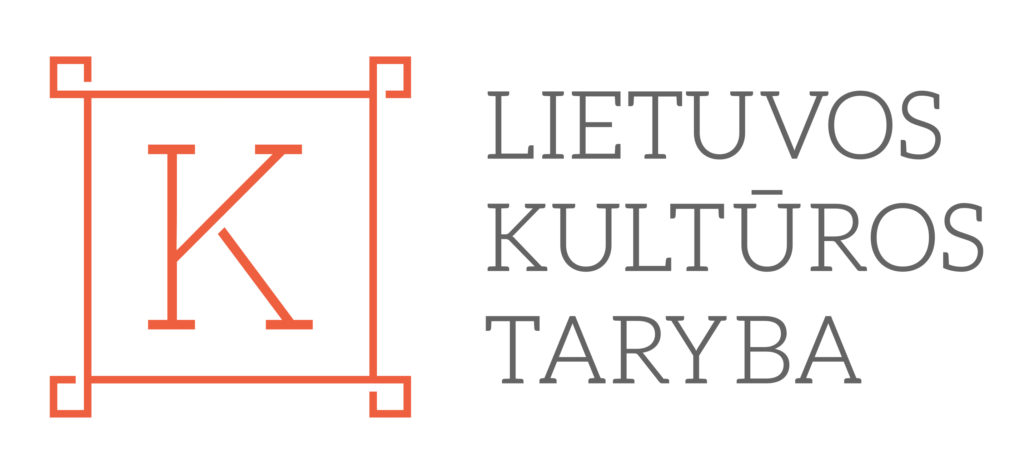
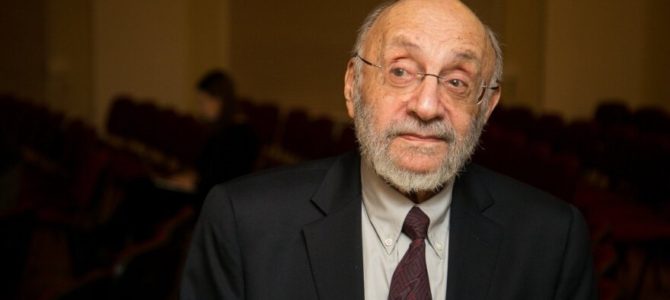
www.DELFI.lt
The Vilnius Gaon Jewish History Museum and the EZCO creative agency are presenting an initiative called “Art Creates Tolerance” inspired by the life and work of Samuel Bak.
The project’s goal is to use Vilnius-born Holocaust survivor Samuel Bak’s art “to encourage public discussion using modern multimedia on the past and socially-sensitive issues of the present, to find historical signs and to discover the value of tolerance,” according to museum director Kamilė Rupeikaitė.
The project will use the museum’s existing physical and virtual exhibits about Bak and expand them with new exhibits.
Full story in Lithuanian here.

Passover, the most important Jewish holiday which lasts for eight days, begins on March 27 this year. The date for celebrating Passover is set by the lunar calendar: the first full moon after the vernal equinox. The name of the holy day comes from “pesakh,” meaning passed over, recalling the story of the Angel of Death which passed over the Israelites before Moses led the slaves out of Egypt.
“The symbolic meaning of this holiday is that it wasn’t separate Jewish families which came out of Egypt, but a single, united Jewish people. The Jewish people throw off the yoke of slavery and leave in order to reach the Promised Land, and there create their nation,” Lithuanian Jewish Community chairwoman Faina Kukliansky explained.
Passover Traditions over the Millennia
Keeper of Jewish cultural and religious traditions Natalija Cheifec said although the exodus from Egypt occurred more than 3,300 years ago, Passover traditions have remained almost unchanged over the many centuries. The main feature of the eight-day holiday is the seder dinner when the Hagada is read out, prayers are made and people sit at the seder table and eat from the seder plate, or ke’are.
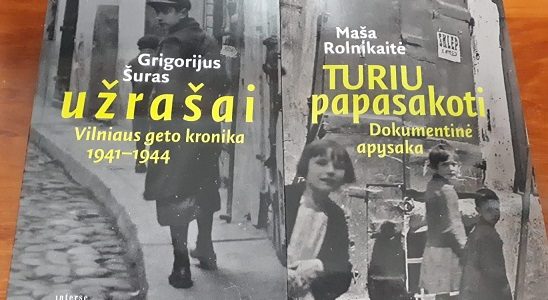
by Eugenijus Bunka
When you speak with those who aren’t there, it’s called Memory. Therefore Maša Rolnikaitė’s book “I Must Tell” [Turiu papasakoti] and Grigoriy Shur’s “Entries: Chronicle of the Vilnius Ghetto, 1941-1944” [Užrašai: Vilniaus geto kronika 1941-1944 m.] are books of Memory. And in memory of those whose lives were cut short, as they began or half-way through, who were consumed in the flames of the Holocaust.
Not one of the people mentioned in these books died a natural death. That inherent human right was taken from them.
They died without notice in World War II, but Maša and Grigoriy who had stood with them spoke loudly.
If a Red Army soldier hadn’t found Maša frozen, lying in a snow drift on the final death march from the Stutthof concentration camp, this book would not exist. The diary she kept hidden on her person would have been buried with her. But she survived and now in eighteen languages her story tells the world what humanity may never allow to happen again.
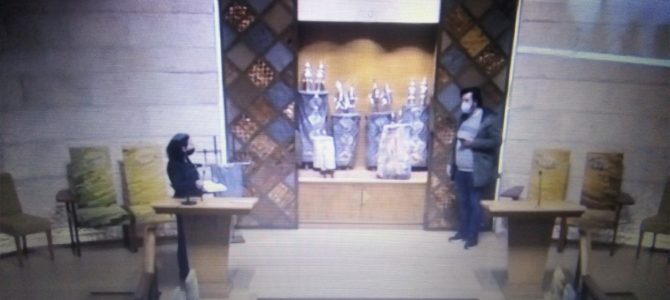
The Lithuanian Jewish Community has been using the Zoom platform to hold virtual Sabbath celebrations with Jewish communities around the world, including lessons on Jewish subjects and meetings with Liberal or Progressive Judaism congregations.
On March 19 the LJC held a joint virtual Sabbath with Rabbis Alexandra Rait and Igor Zinkov at the London Liberal Synagogue.
Rabbi Alexandra’s ancestors came from Plungė, Lithuania. Her great-grandfather N. Levit was also a rabbi. Her grandfather left Lithuania for New York, but ended up in Dublin instead. It seems the ship’s captain lied to the young man about their final destination.
Rabbi Alexandra Rait said her family visited Lithuania several years ago and toured Vilnius, Kaunas and Plungė. She recalled ushering in the Sabbath in an abandoned synagogue in Plungė where her ancestor had led prayer services. “There was no electricity and we read the prayers by candle light. There was loud thunder, and it rained. … We also visited the mass murder site in Plungė. My cousin was working with the Tolerance Center in Plungė.” She recalled how her family financed a commemorative marker at that mass murder site. “We also met the last Jew from that shtetl, the famous woodcarver and sculptor Jakovas Bunka, and his son Eugenijus,” Rabbi Rait said during the virtual Sabbath last week.
Rabbi Igor Zinkov was born in Chelyabinsk to a family of secular Jews with roots in Odessa and Kiev.

Lrytas.lt
“On Friday the working group adopted a conclusion proposing the parliamentary leadership ask the parliament to consider whether Adas Jakubauskas is the appropriate person to hold the post of general director of the Center for the Study of the Genocide and Resistance of Residents of Lithuania,” working group director MP Radvilė Morkūnaitė-Mikulėnienė told BNS.
Six members voted in favor and one against this conclusion. Radvilė Morkūnaitė-Mikulėnienė said everyone was interested in seeing a strong Genocide Center which would operate smoothly and represent the interests of the Lithuanian state.
“… It has become clear A. Jakubauskas has not been successful in insuring the smooth operation of the institution,” she said. “The director of the Center has not been successful in solving arising problems in a constructive manner. The method of operation selected has only increased stress and conflict within the center he directs. Also, the constant public reports about the situation in the Center diminishes the exemplary reputation of this institution.”
Peasants Party MP Jonas Jarutis voted against the finding, saying he was disappointed other members of the working group had taken the easy way out.
Over a dozen historians and academics staged a protest Friday outside the Genocide Center in Vilnius. They said they wanted to show support for historian Mingailė Jurkutė who was terminated. She also took part in the protest. Protestors also said they wanted to bring attention to Center director Jakubauskas’s attempts to restrict freedom of speech and inquiry.
The leadership of parliament, that institution’s nominal board of directors composed of the heads of major factions there, could initiate Jakubauskas’s removal from the post of general director, as could a parliamentary committee, or a call by MPs with one-fifth voting for this.
Full story in Lithuanian here.
.
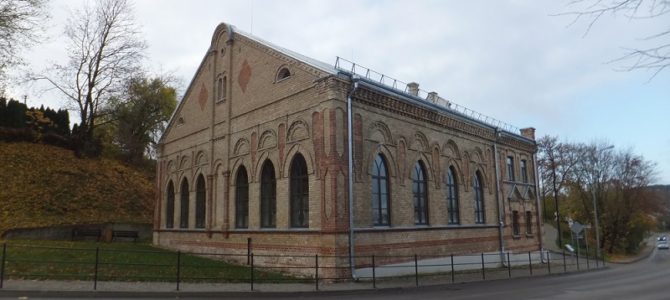
Cultural Infrastructure Center
The Cultural Infrastructure Center of Lithuania is completing renovation work on the synagogue in Alytus. Emergency preservation work followed by renovation led to a fuller restoration and the building is now housing a section of the Alytus Museum.
The old synagogue on Kauno street in Alytus, Lithuania, appeared in total ruin just five years ago, with boarded-up windows and bricks falling from the walls. Experts saw even worse things at work.
“The condition of the outer wall was poor… In spots several bricks were missing, and in some places even larger sections of bricks had fallen out. The mortar on the lower portion was visibly damaged by moisture or salt which it will still take several years to drive out of the building walls. The façades on the southern side of the building were especially damaged. We found the interior also deeply damaged, with the floor dug up and windows and doors removed,” Cultural Infrastructure Center acting deputy director Viktoras Vilkišius said.
Strong Jewish Community Formerly Lived in Alytus
The first wooden synagogue was built in the western section of Alytus in 1856 apparently at the same site the currently restored synagogue occupies. It was a small building heated with a stove and housed a school and the rabbi’s living quarters.
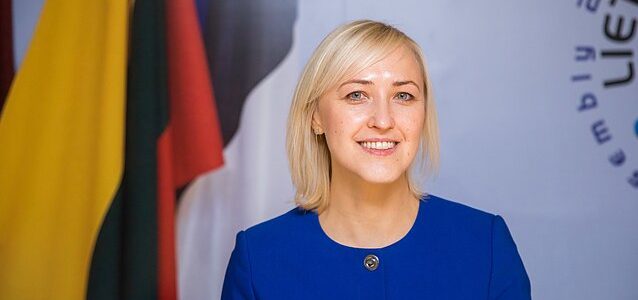
Member of parliament Paulė Kuzmickienė has been chosen to succeed Valdas Rakutis as chairwoman of the Lithuanian parliament’s Commission on Battles for Freedom and State Historical Memory. Paulė Kuzmickienė is a member of the Conservative Party/Lithuanian Christian Democratic Party faction in parliament. Fourteen members of the Commission voted in favor of her, one against and one abstained Wednesday. The move must still be approved by the parliament.
Outgoing chairman Valdas Rakutis resigned the post in late January after causing scandal with his remarks on the Holocaust. On International Holocaust Remembrance Day he published an article saying Jews had collaborated with the Nazis and Soviets. His statements were criticized by the Lithuanian Jewish Community, foreign diplomats and leaders in the Lithuanian Christian Democratic Party.
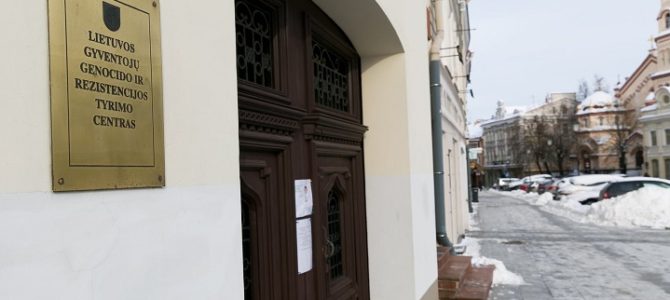
Lrytas.lt
Radvilės Morkūnaitė-Mikulėnienė, head of the Lithuanian parliamentary working group convened to inquire into problems at the Center for the Study of the Genocide and Resistance of Residents of Lithuania, says while MPs hold different opinions regarding the state history institution, they were unanimous in the finding dialogue won’t bridge the divide between the Genocide Center’s leadership and some of its staff.
The working group plans to release their findings Friday.
“We decided to make a final decision Friday morning. The views of commission members are somewhat at odds, but basically everyone who spoke said the Center is experiencing problems and it doesn’t appear there is a desire to come to terms,” Morkūnaitė-Mikulėnienė told ELTA Wednesday.
She pointed to the Center’s leadership as the main culprits, saying that became clear when general director Adas Jakubauskas fired historian Mingailė Jurkutė.
Full story in Lithuanian here.
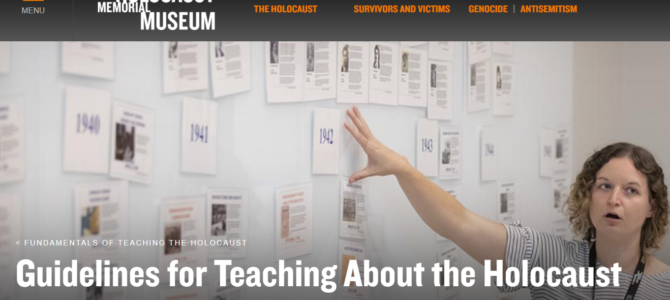
U.S. Department of State | Thursday, March 18, 2021 | 11:30 a.m.-12:30 p.m. EDT
The State Department’s Special Envoy for Holocaust Issues cordially invites you to a webinar on the challenges European and American educators face in teaching about the Holocaust to a new generation of learners. Holocaust educators will compare educational landscapes, discuss best practices and areas for cooperation, and speak to the challenges presented by rising anti-Semitism worldwide as well as the greater reliance on virtual schooling in a (post)-COVID world.
Please register by completing the form below.
This Zoom webinar will be in English. Participants will have an opportunity to submit questions in writing during the webinar or in advance by email to: SEHI-EVENTS@state.gov. This invitation may be shared with trusted colleagues and friends.
Featuring:
Judita Mackevičienė, a long-time active member of the Kaunas Jewish Community, has died. She was born in 1936. She served as chairwoman of the Rescuers’ Committee and for many years planned and held events to commemorate those who rescued Jews from the Holocaust and carefully researched and documented these stories.
A survivor of the Holocaust herself, Mackevičienė didn’t harbor bitterness and always displayed love and goodwill towards the world and the people around her.
We send our deepest condolences to her daughers, grandchildren and many friends and relatives.

Dear Community members,
We invite you and your entire family to this event “Sabbath Discussion: Zionism among the Litvaks” including discussion of the Vilna Gaon, Eliezer Ben-Yehuda and Menachem Begin followed by the traditional havdalah ceremony at 6:30 P.M. on February 27. You will receive the Zoom address after registering here:
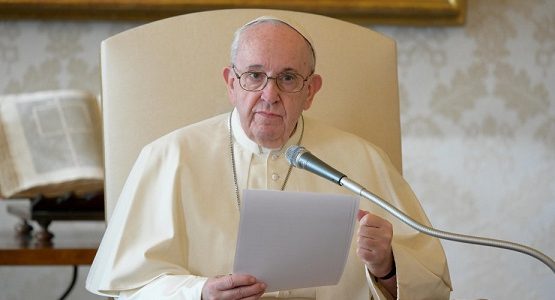
NEW YORK–Today Pope Francis made a Shabbat visit to Edith Bruck, an 89-year-old Hungarian-born Holocaust survivor, at her home in Rome.
“I have come here to thank you for your testimony and to pay homage to the people martyred by the insanity of Nazi populism,” the Pope told her, according to the Vatican.
World Jewish Congress president Ronald S. Lauder applauded the Pope:
“I am deeply appreciative of Pope Francis’s tremendous compassion in visiting Edith Bruck who survived the horror of several Nazi concentration camps, lost her family who were murdered in the Holocaust and has bravely shared her story. The Pope has demonstrated a sincere commitment to both personal kindness for the experiences of others and to the urgency of continuing to draw attention to the inhuman atrocities of genocides including the Holocaust. At a time when neo-Naziism, anti-Semitism and other bigotries are resurgent in many parts of the world, Pope Francis’s moral integrity and sense of history set the standard for other faith, political and community leaders to follow.
“My gratitude goes as well to Mrs. Bruck for her courage in telling the world about her trauma and in dedicating her life to educating people about the horrible truths of the Holocaust. As survivors age, their testimonies become increasingly priceless, and we owe our understanding of the very worst of humankind to the individuals who have taken it upon themselves to bear witness to all they have endured. Through such comprehension, we pray that such evil shall never happen again.”

CNN–A Tennessee resident who was a guard at a Nazi concentration camp during World War II has been deported to Germany, the US Justice Department said in a statement Friday.
Friedrich Karl Berger, a 95-year-old German citizen, was ordered removed from the US in February of 2020 when a US immigration judge determined his “willing service” as a guard of concentration camp prisoners “constituted assistance in Nazi-sponsored persecution,” the Justice Department said.
Berger was eligible for removal from the US under the Holtzman Amendment which prohibits anyone who participated in Nazi persecution from living in the US. The Board of Immigration Appeals upheld the ruling in November of 2020.
Full story here.

The prosecutor at the Vilnius District Office of Prosecutor has decided not to begin a pre-trial investigation of statements made by member of parliament Valdas Rakutis in his article “International Holocaust Day and Historical Memory.” The prosecutor said the decision was made based on the lack of an act of a criminal nature, a press release said.
The decision not to initiate a pre-trial investigation was made following a statement from the chairwoman of the Lithuanian Jewish Community which indicated historian and MP Rakutis published the article on International Holocaust Remembrance Day on an internet site which allegedly incited hatred against Jews and their people, and possibly engaged in Holocaust denial.
The informant asked the prosecutor to consider whether or not the statements made in the article constituted the criminal act defined in article 170, part 2 of the Lithuanian criminal code, “incitement against any national, racial, ethnic, religious or other kind of group of people,” and article 170-2, part 1, “public approval for international crimes, crimes committed by the USSR and Nazi Germany against the Republic of Lithuania or residents thereof, and their denial or gross trivialization.”
The decision to decline beginning a pre-trial investigation stated the criminal acts defined in article 170, part 2, and article 170-2, part 1, can only be committed by direct intention.

by professor Rimvydas Petrauskas, rector, Vilnius University, for DELFI.lt
Recent discussions on the topic of historical memory and policy have brought to the fore the issue of the role the professional historian plays in shaping the public’s historical memory. This text is about history, historians, historical memory and the historian’s mission.
History and Historians
The noted French historian Jacques Le Goff who died a few years ago spoke about the relationship between history and the present, soberly saying history can at one and the same time be that which connects, and that which afflicts. It can be utilized for the most different ends, to encourage healthy patriotism and to justify the annexation of another country, and those are just two of the more extreme poles. At the same time, Le Goff explained, the discipline of histry should help people live their lives and in communal life, help them navigate between a rich legacy of the past and what is sometimes a dangerous nostalgia.
He knew what he was talking about. In 1942 his teacher Marc Bloch, founder of the Annales School of French social history, had lost his job, books and some of his old friends in occupied France, but authored what is probably the most optimistic explanation of history ever, calling for seeking out historical truth in the face of historical tragedy. This member of the French Resistance was shot two years later by the Nazis.
Full text in Lithuanian here.
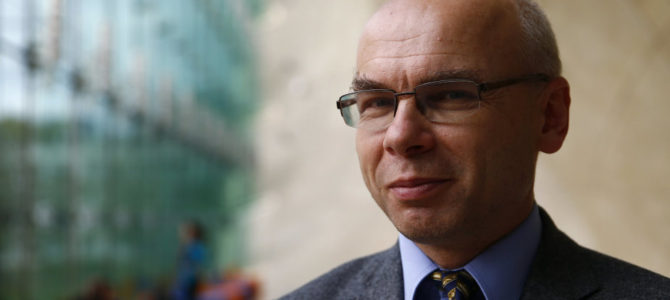
15min.lt

Historian Dariusz Stola says there is a campaign underway in Poland to frighten historians who speak about Holocaust crimes committed by Poles. The result, he says, is invisible: books and articles which are never written. Stola says 10 years ago he was sure it would only get easier to talk about these complex historical events as time passed. Now something has changed, and it might be related to the growth of social media.
Stola is a professor of history at the Polish Academy of Sciences and served earlier as the director of Poland’s Jewish History Museum POLIN.
After five years directing POLIN Stola submitted an application to be rehired and received 11 of 15 votes by judges on the hiring commission, but the Polish minister of culture refused to appoint him director again.
We caught up with Stola a few days after a Polish court ordered two of the country’s leading historians to apologize to the niece of a village alderman who claimed Polish historians Barbara Engelking and Jan Grobowski libeled her relative in the monograph they coauthored where they wrote he was an accomplice in the mass murder of Jews.
Indirect Government Intervention
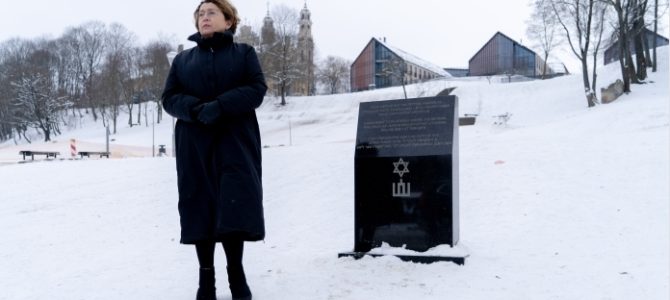
In remembrance of signatories of conscience
Lithuanian Jewish Community chairwoman Faina Kukliansky’s observations on the eve of the 103rd celebration of February 16
We live in good times, incomparable to those which the Lithuanian Jewish community experiences eight decades ago. We live in a time of great achievements and at the same time there is still much to achieve. We live at a time when we still have to explain and defend ourselves, and we do this patiently but resolutely. We live at a time when society is crossing swords over ideas, attitudes and, most significantly, statues. Let this be the tale of two statues which don’t exist.
We are about to celebrate February 16, Lithuania Day, for the 103rd time. When we name the names of the signatories to the Lithuanian Act of Independence, this shows that the date for us is not just an historical day, but the triumph of the personal decision made by specific people whose result–a free and sovereign country–we all enjoy and take pride in. In the context of February 16, let’s also remember another group of people, a group I call signatories of conscience, the people whose decision resulted in hundreds of lives saved.
During the different Holocaust commemorations we often hear people taking pride that over 900 Lithuanians have been named Righteous Gentiles, but I don’t hear their names or their stories. I see the lack of context. And the context is very simple: the citizens of the first Republic of Lithuania, the same people who forged the young state, heard the Jews’ cry for help and responded. Do you think about the fact that generation which hid persecuted Jews on their farms, in their apartments and basements were the same people who created the first Lithuanian Republic? That they are the same generation whose achievements in art, learning and politics we take pride in today, whose deeds and lives we cite today as examples in the creation of the state? They include the family of February 16th signatory and engineer Steponas Kairys, and Lithuanian president Kazys Grinius, and the daughter of M. K. Čiurlionis, one of Lithuania’s greatest artists, Danutė Čiurlionytė abd her husband Vladimiras Zubovas, the family of Lithuanian writer Balys Sruoga, the family of writer Kazys Binkis, and professor Pranas Mažylis, the grandfather of Liudas Mažylis who rediscovered the original Lithuanian proclamation of independence German archives. They include Ona Jablonskytė, the daughter of the founder of the standard Lithuanian language Jonas Joblonskis, and his daughter-in-law advyga Jablonskienė. And not just presidents and professors, but simple village people were able to make the right choice. These are names which are inseparable from the history of Lithuania. Why don’t we want to erect a statues to these people, Lithuania’s signatories of conscience?